Choosing the right foods is essential for maintaining good health and preventing disease.
In this article, we explore the Top 10 Healthiest Foods to Eat, each packed with vital nutrients that support overall well-being.
From leafy greens to fatty fish, these foods can boost your energy, strengthen your immune system, and improve heart health.
Incorporating these superfoods into your diet is a key step toward achieving a balanced, nutritious lifestyle.
10. Greek Yogurt: Probiotic-Rich for Gut Health

Key Nutrients in Greek Yogurt:
- Probiotics: Support a healthy gut microbiome, aiding in digestion and immune function.
- High-Quality Protein: Essential for muscle repair and maintenance.
- Calcium: Important for bone and teeth health.
- Vitamin B12: Supports red blood cell production and brain function.
Additional Benefits:
- Gut Health: Probiotics help improve digestion and can alleviate bloating and discomfort.
- Bone Health: High calcium content helps prevent osteoporosis and maintains bone strength.
- Weight Management: High in protein, promoting satiety and reducing appetite.
- Low in Sugar: Choose plain Greek yogurt to avoid added sugars and maximize health benefits.
Greek yogurt is a nutrient-dense dairy product that is packed with protein, calcium, and probiotics, the beneficial bacteria that support a healthy gut microbiome.
The probiotics found in Greek yogurt help improve digestion, enhance immune function, and may even contribute to better mental health.
Greek yogurt is thicker and creamier than regular yogurt, with a higher protein content, making it an excellent option for those looking to increase their protein intake.
Its high calcium content also supports strong bones and teeth. Opt for plain, unsweetened Greek yogurt to avoid added sugars and maximize the health benefits.
9. Legumes: Plant-Based Protein and Fiber
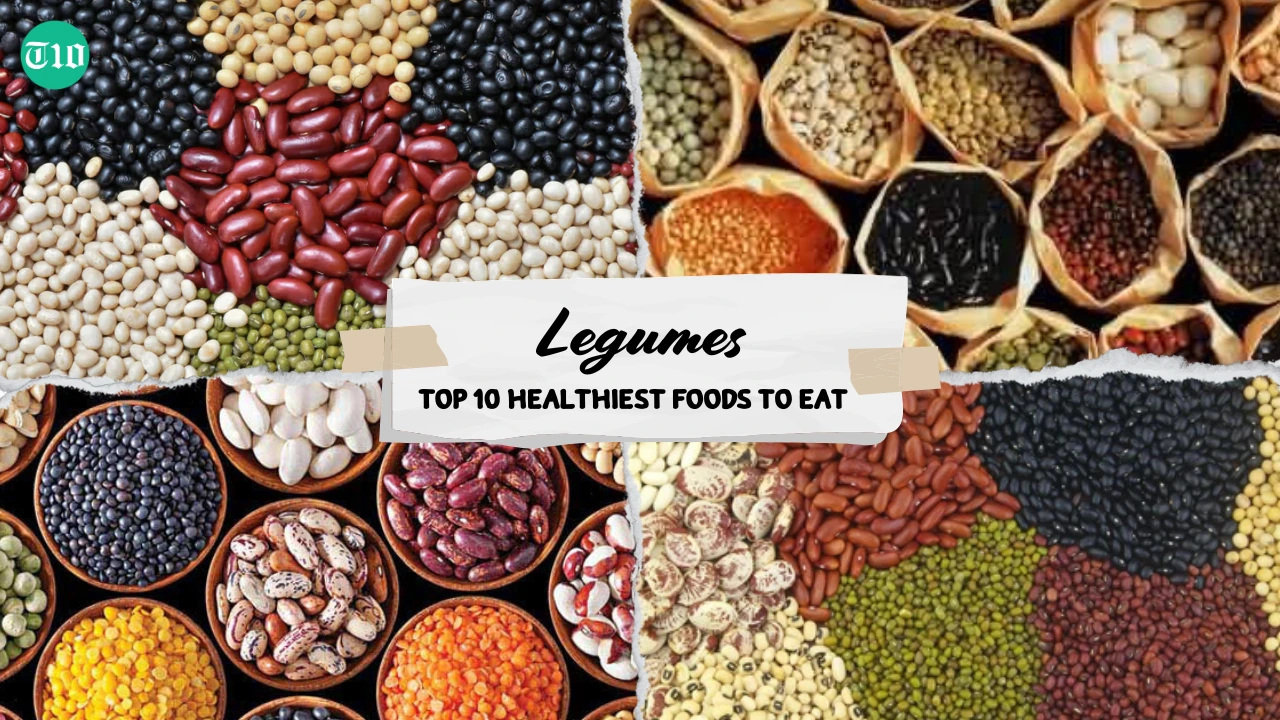
Key Nutrients in Legumes:
- Plant-Based Protein: Essential for muscle repair and growth, especially in plant-based diets.
- Fiber: Promotes gut health, regulates digestion, and helps control blood sugar levels.
- Iron: Supports healthy blood and oxygen transport.
- Magnesium: Helps with energy production and supports bone health.
Additional Benefits:
- Heart Health: Helps lower blood pressure and cholesterol levels.
- Low Glycemic Index: Helps regulate blood sugar levels, making legumes a good choice for diabetics.
- Sustainable Protein Source: A great alternative to meat, providing protein with less environmental impact.
Legumes, including beans, lentils, chickpeas, and peas, are excellent sources of plant-based protein, fiber, and essential nutrients such as iron, magnesium, and folate.
They are low in fat, making them a heart-healthy choice that can help lower blood pressure and cholesterol levels.
The high fiber content in legumes promotes digestive health, supports weight management, and helps stabilize blood sugar levels, making them particularly beneficial for people with diabetes.
Legumes are also versatile and can be used in a variety of dishes, from soups and salads to stews and spreads, providing a nutritious and satisfying meal option.
8. Eggs: Complete Protein with Essential Nutrients
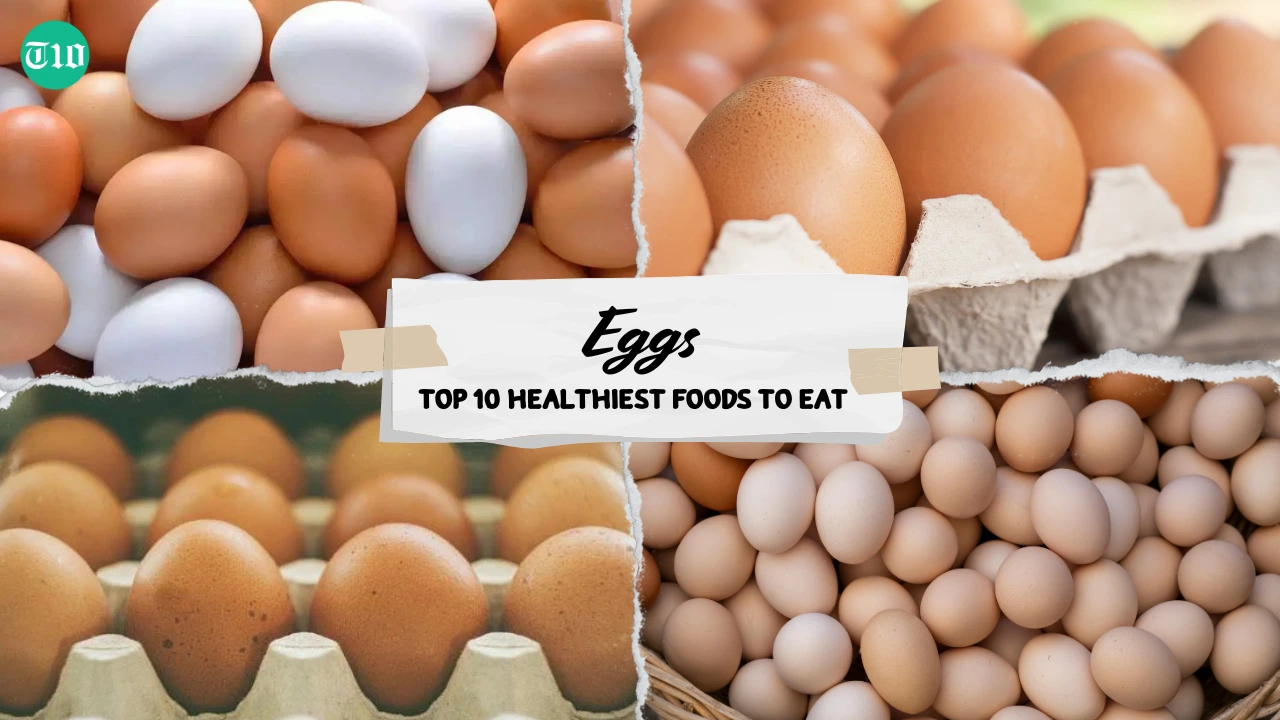
Key Nutrients in Eggs:
- High-Quality Protein: Contains all nine essential amino acids.
- Choline: Vital for brain development and liver function.
- Lutein and Zeaxanthin: Antioxidants that promote eye health.
- Vitamin D: Supports bone health and immune function.
Additional Benefits:
- Muscle Maintenance: Protein in eggs helps maintain and repair muscle tissue.
- Cognitive Health: Choline supports memory and brain function.
- Versatile Nutrition: Low in calories but nutrient-dense, making them ideal for any meal.
Eggs are a highly nutritious and affordable source of high-quality protein, containing all nine essential amino acids that the body needs for muscle repair and growth.
They are also one of the best dietary sources of choline, a nutrient crucial for brain health and fetal development during pregnancy.
Eggs are rich in antioxidants like lutein and zeaxanthin, which help protect the eyes from cataracts and age-related macular degeneration.
Despite previous concerns about cholesterol, research has shown that moderate egg consumption does not raise the risk of heart disease in healthy individuals.
Eggs can be enjoyed in countless ways and are a staple in many diets worldwide.
7. Avocados: Heart-Healthy Monounsaturated Fats
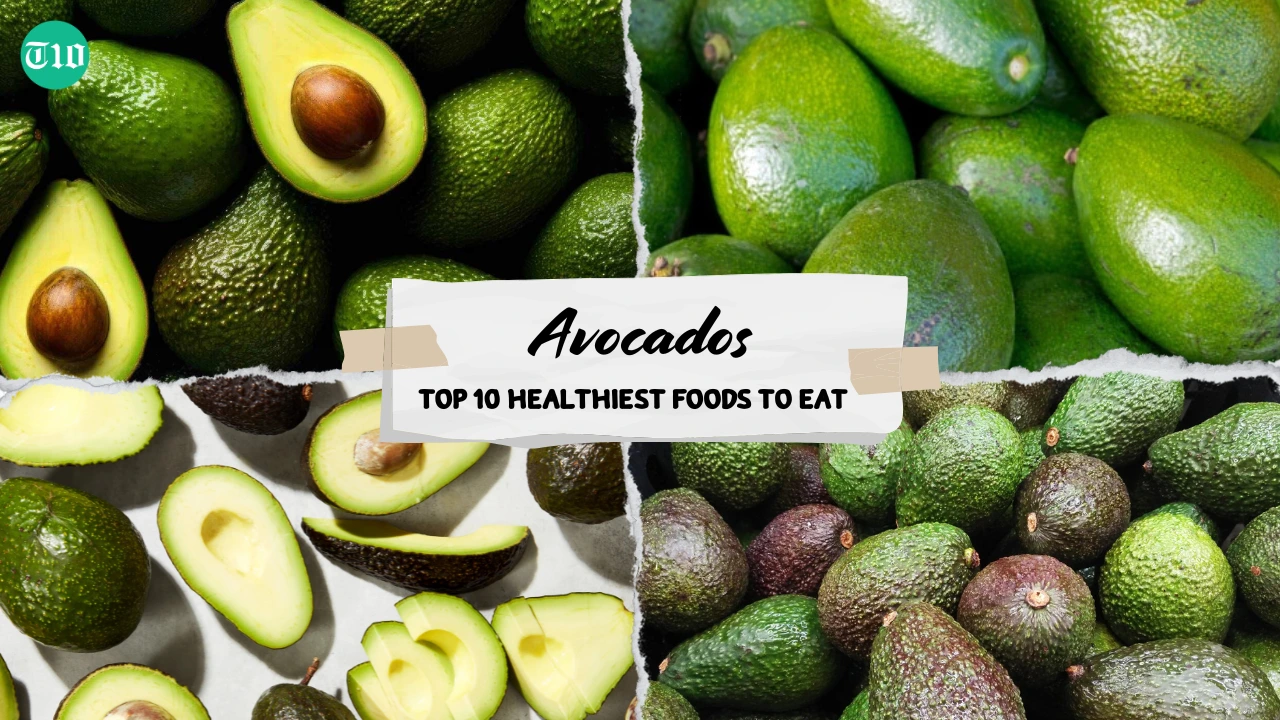
Key Nutrients in Avocados:
- Monounsaturated Fats: Improves cholesterol levels and supports heart health.
- Potassium: Helps maintain healthy blood pressure and balance electrolytes.
- Fiber: Supports digestion and promotes fullness.
- Folate: Important for cellular function, particularly during pregnancy.
Additional Benefits:
- Eye Health: Rich in lutein and zeaxanthin, antioxidants that protect the eyes.
- Weight Management: High in fiber and healthy fats, promoting satiety.
- Anti-Inflammatory: The fats and antioxidants in avocados help reduce inflammation in the body.
- Nutrient Absorption: Helps increase the absorption of fat-soluble vitamins (A, D, E, K) from other foods.
Avocados are prized for their creamy texture and high content of heart-healthy monounsaturated fats, which have been shown to improve cholesterol levels and reduce the risk of heart disease.
In addition to healthy fats, avocados are a good source of potassium, which helps regulate blood pressure, and fiber, which aids in digestion and promotes satiety.
Avocados also contain antioxidants such as lutein and zeaxanthin, which are important for eye health and protecting against age-related vision problems.
Their versatility in the kitchen makes avocados a popular ingredient in salads, sandwiches, smoothies, and more.
Eating avocados regularly can contribute to a well-rounded, nutrient-dense diet.
6. Whole Grains: Complex Carbohydrates for Sustained Energy

Key Nutrients in Whole Grains:
- Fiber: Aids in digestion, promotes gut health, and regulates blood sugar levels.
- B Vitamins (Thiamin, Riboflavin, Niacin): Important for energy metabolism and brain health.
- Magnesium: Helps maintain normal muscle and nerve function, and regulates blood pressure.
- Iron: Necessary for oxygen transport in the blood and energy production.
Additional Benefits:
- Weight Management: Promotes satiety, helping prevent overeating.
- Heart Health: Lowers the risk of heart disease by reducing cholesterol and improving blood pressure.
- Digestive Health: Reduces the risk of constipation and helps feed healthy gut bacteria.
Whole grains, including quinoa, oats, brown rice, and barley, are a vital source of complex carbohydrates, providing the body with sustained energy throughout the day.
Unlike refined grains, which have been stripped of their nutrient-rich components, whole grains retain their bran, germ, and endosperm, offering a wealth of fiber, B vitamins, and minerals like iron and magnesium.
The high fiber content in whole grains supports digestive health, helps regulate blood sugar levels, and promotes a feeling of fullness, making them ideal for weight management.
Whole grains have been shown to lower the risk of heart disease, type 2 diabetes, and certain cancers, making them an integral part of a balanced diet.
5. Cruciferous Vegetables: Cancer-Fighting Foods
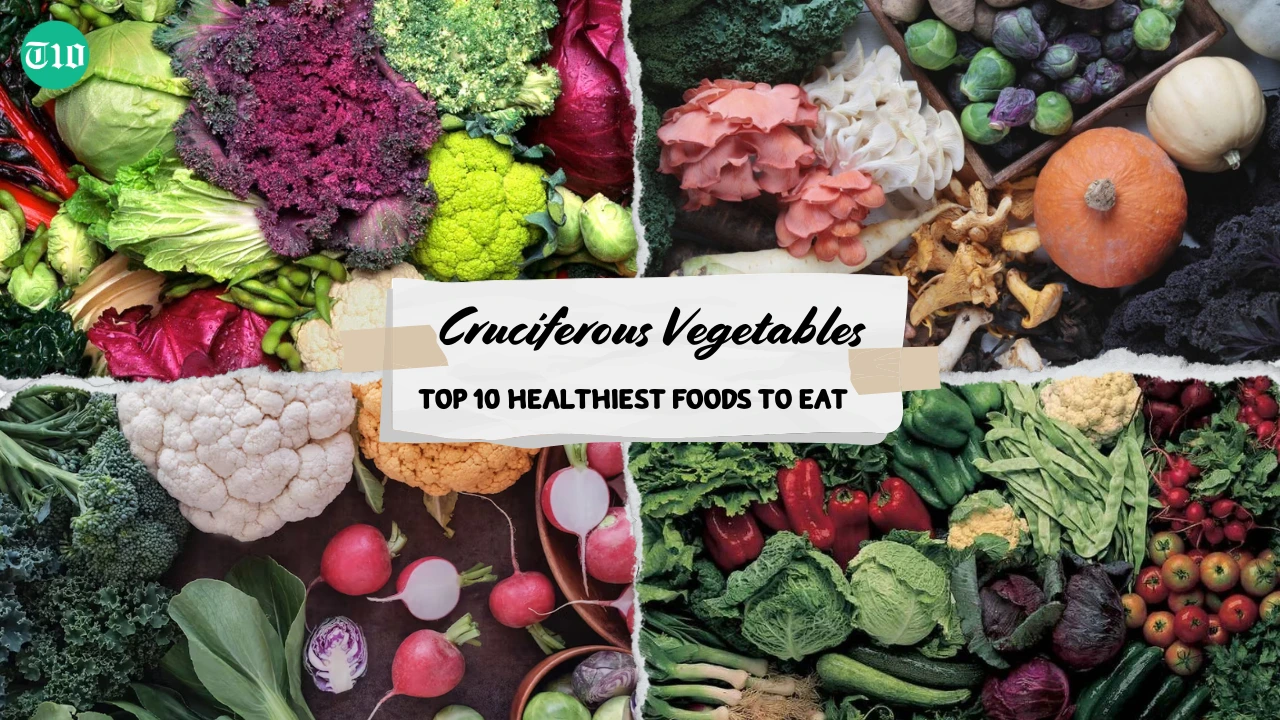
Key Nutrients in Cruciferous Vegetables:
- Sulforaphane: A compound that has potent anti-cancer properties.
- Fiber: Supports digestive health and helps maintain bowel regularity.
- Vitamin C: Boosts immune function and enhances skin health.
- Vitamin K: Essential for blood clotting and bone health.
Additional Benefits:
- Detoxification: Promotes the elimination of toxins from the body.
- Heart Health: Lowers cholesterol and improves arterial function.
- Cancer Prevention: Linked to a reduced risk of lung, breast, and colorectal cancers.
Cruciferous vegetables, such as broccoli, Brussels sprouts, cauliflower, and cabbage, are known for their high content of sulfur-containing compounds like sulforaphane, which have been studied for their cancer-preventing properties.
These vegetables are also rich in fiber, vitamins C and K, and folate, making them excellent for boosting immunity, supporting bone health, and promoting healthy digestion.
Cruciferous vegetables have unique detoxifying abilities, helping the body eliminate harmful toxins and reduce the risk of cancers, particularly those affecting the digestive system.
Their versatility allows them to be enjoyed in various ways, whether steamed, roasted, or incorporated into soups and salads.
4. Nuts and Seeds: Protein-Packed Healthy Fats
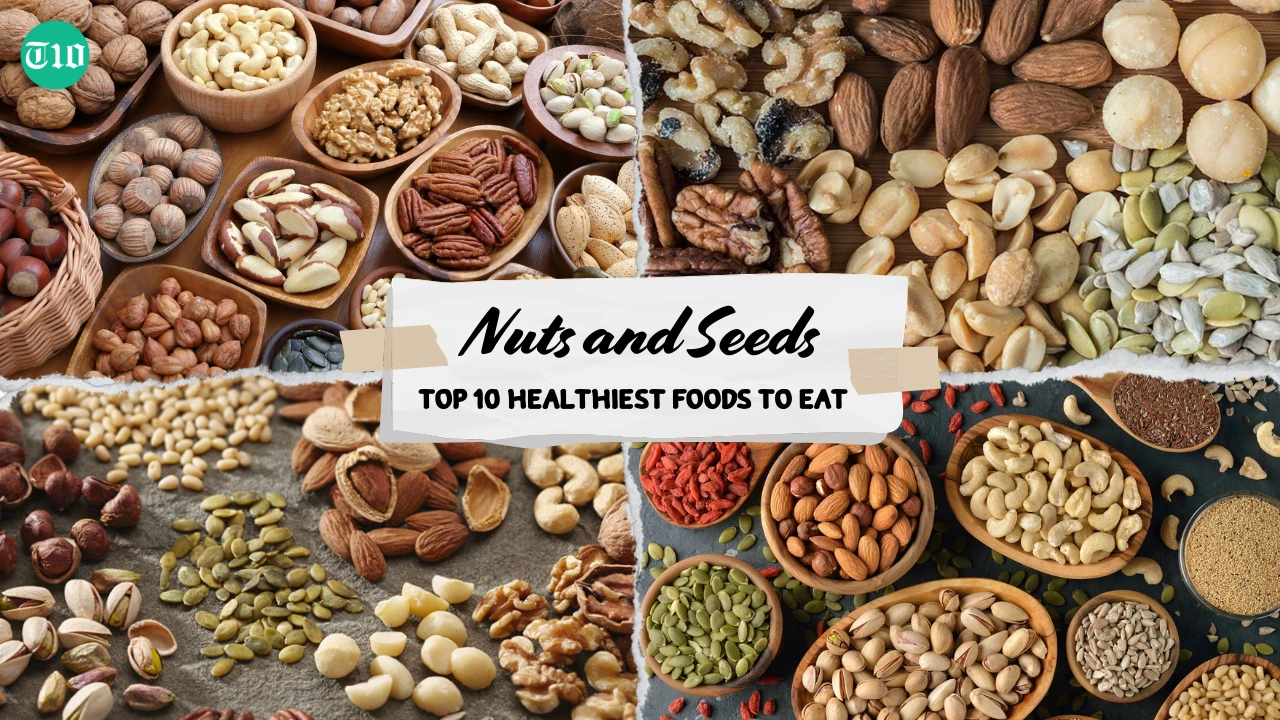
Key Nutrients in Nuts and Seeds:
- Omega-3 Fatty Acids: Promote brain function and reduce inflammation.
- Magnesium: Supports muscle and nerve function, and helps regulate blood sugar.
- Vitamin E: An antioxidant that protects cells from damage and promotes skin health.
- Fiber: Aids digestion and promotes fullness, supporting weight control.
Additional Benefits:
- Heart Health: Helps lower bad cholesterol (LDL) and raise good cholesterol (HDL).
- Bone Health: Rich in calcium and magnesium, which are vital for strong bones.
- Anti-inflammatory Properties: Can help reduce chronic inflammation in the body.
- Plant-Based Protein: Great for vegetarians and vegans, providing essential amino acids.
Nuts and seeds, including almonds, walnuts, chia seeds, and flaxseeds, are compact sources of healthy fats, plant-based protein, and fiber.
They are rich in omega-3 fatty acids and monounsaturated fats, which promote heart health by lowering bad cholesterol (LDL) and increasing good cholesterol (HDL).
Nuts and seeds also provide essential vitamins and minerals, such as magnesium, which supports muscle and nerve function, and vitamin E, a powerful antioxidant that helps protect cells from damage.
Their combination of protein and fiber makes them highly satiating, which can aid in weight management by reducing hunger and preventing overeating.
Incorporating a small handful of nuts and seeds into your daily diet can provide lasting health benefits.
3. Fatty Fish: Omega-3-Rich Protein Sources

Key Nutrients in Fatty Fish:
- Omega-3 Fatty Acids (EPA and DHA): Support heart, brain, and eye health, and reduce inflammation.
- Vitamin D: Essential for bone health and immune function.
- Protein: Provides essential amino acids for muscle repair and overall growth.
- B Vitamins: Play a role in energy production and brain health.
Additional Benefits:
- Brain Health: Improves memory, cognitive function, and may reduce the risk of depression.
- Joint Health: Omega-3s help reduce symptoms of arthritis.
- Cardiovascular Health: Reduces the risk of heart attack and stroke by lowering blood triglycerides.
Fatty fish such as salmon, mackerel, sardines, and trout are among the best sources of omega-3 fatty acids, which are crucial for heart health, brain function, and reducing inflammation in the body.
Omega-3s are essential fats that our bodies cannot produce on their own, so they must be obtained from food.
Regular consumption of fatty fish has been shown to lower the risk of cardiovascular disease, support cognitive health, and even improve mood and mental well-being.
In addition to omega-3s, fatty fish provide high-quality protein, vitamin D, and B vitamins, making them a comprehensive source of nutrition.
Eating fatty fish at least twice a week is recommended to maintain optimal health.
2. Berries: Antioxidant-Rich Superfoods

Key Nutrients in Berries:
- Vitamin C: Boosts the immune system and promotes skin health.
- Fiber: Supports digestion and helps control blood sugar levels.
- Anthocyanins (Antioxidants): Combat oxidative stress and inflammation.
- Manganese: Plays a role in bone development and metabolism.
Additional Benefits:
- Cognitive Function: May improve memory and reduce the risk of neurodegenerative diseases.
- Heart Health: Helps lower blood pressure and reduce cholesterol levels.
- Weight Management: Low in calories and naturally sweet, perfect for satisfying sugar cravings.
Berries, including blueberries, strawberries, raspberries, and blackberries, are celebrated for their potent antioxidant properties.
These small, vibrant fruits are packed with vitamin C, fiber, and powerful plant compounds like anthocyanins, which have been shown to protect against oxidative stress and reduce inflammation.
Berries are also linked to improved heart health, as they can help lower blood pressure and cholesterol levels.
Additionally, they support cognitive function and memory retention, making them an excellent choice for long-term brain health.
With their naturally sweet taste and low calorie count, berries make for a perfect snack or addition to smoothies, salads, or desserts.
1. Leafy Greens: Nutrient-Dense Powerhouses
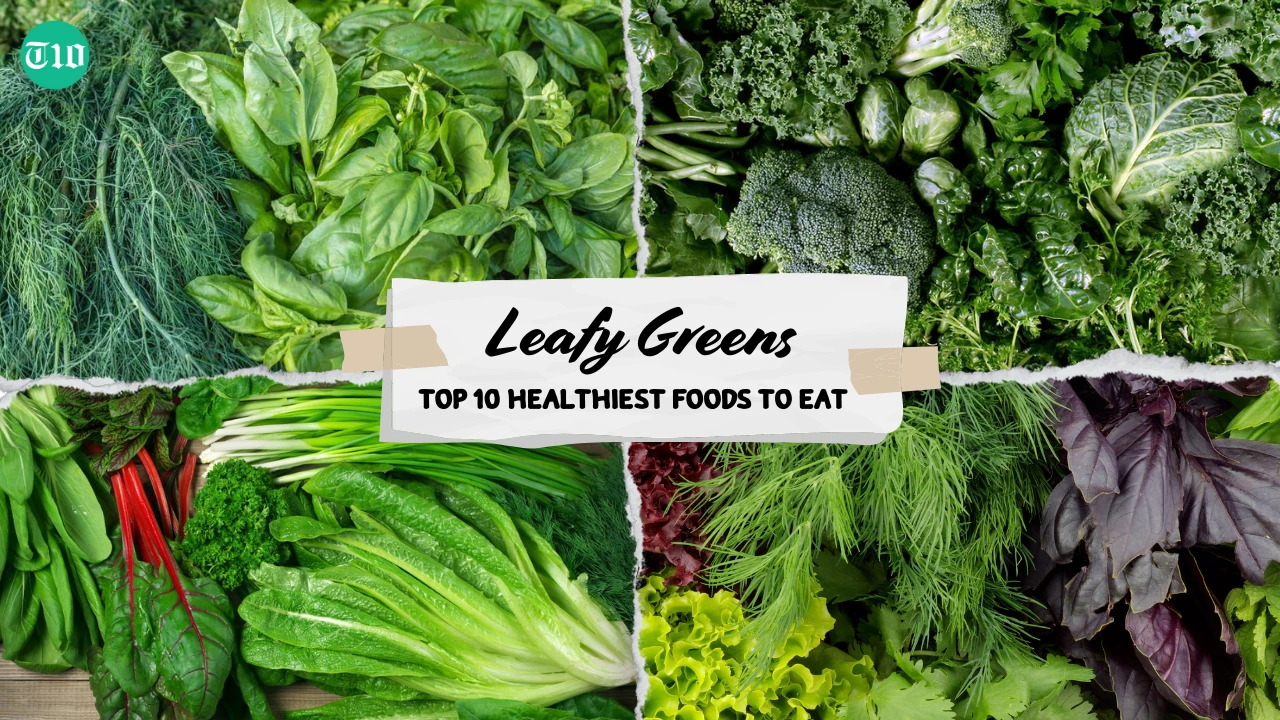
Key Nutrients in Leafy Greens:
- Vitamin K: Promotes bone health and aids in blood clotting.
- Folate: Essential for DNA synthesis, cell growth, and repair.
- Antioxidants (Beta-carotene, Lutein): Protect cells from oxidative stress and reduce inflammation.
- Calcium: Supports bone strength and nerve function.
- Fiber: Aids digestion and helps regulate blood sugar levels.
Additional Benefits:
- Heart Health: Reduces blood pressure and lowers cholesterol.
- Eye Health: Rich in lutein, which supports vision and reduces the risk of cataracts.
- Anti-Inflammatory: Helps manage inflammation linked to chronic diseases.
Leafy greens, such as spinach, kale, Swiss chard, and collard greens, are incredibly nutrient-dense, low in calories, and packed with essential vitamins and minerals.
They are particularly rich in vitamins A, C, K, and folate, which are vital for maintaining eye health, boosting immunity, and supporting bone health.
Leafy greens also contain antioxidants that help fight inflammation and reduce the risk of chronic diseases such as heart disease and diabetes.
The fiber content in these vegetables promotes healthy digestion and aids in maintaining stable blood sugar levels.
By adding a variety of leafy greens to your meals, you can significantly enhance the nutritional quality of your diet.
Conclusion – Top 10 Healthiest Foods to Eat
Adding the Top 10 Healthiest Foods to Eat to your daily meals can significantly improve your health and wellness.
These nutrient-dense foods provide essential vitamins, minerals, and antioxidants that promote better digestion, heart health, and overall vitality.
By making them a regular part of your diet, you can take control of your well-being and enjoy the lasting benefits of a healthy, balanced life.
List of Top 10 Healthiest Foods to Eat
Here is a table summarizing the Top 10 Healthiest Foods to Eat with their key benefits and main nutrients.
| Food | Key Benefits | Main Nutrients |
|---|---|---|
| Leafy Greens | Reduces inflammation, supports heart health, improves digestion | Vitamin A, Vitamin C, Vitamin K, Folate, Calcium |
| Berries | Rich in antioxidants, promotes heart health, supports cognitive function | Fiber, Vitamin C, Antioxidants (Anthocyanins) |
| Fatty Fish | Supports brain health, reduces inflammation, promotes heart health | Omega-3 Fatty Acids, Vitamin D, Protein |
| Nuts and Seeds | Improves heart health, aids digestion, helps in weight management | Omega-3s, Fiber, Magnesium, Vitamin E |
| Cruciferous Vegetables | Fights cancer, promotes detoxification, boosts immune system | Fiber, Sulforaphane, Vitamin C, Vitamin K |
| Whole Grains | Sustained energy, supports digestion, stabilizes blood sugar | Fiber, B Vitamins, Magnesium |
| Avocados | Improves cholesterol, promotes heart health, anti-inflammatory | Monounsaturated Fats, Potassium, Antioxidants |
| Eggs | High-quality protein, supports brain and eye health | Protein, Choline, Lutein, Zeaxanthin |
| Legumes | Supports heart health, aids in weight management, plant-based protein source | Fiber, Iron, Magnesium, Protein |
| Greek Yogurt | Promotes gut health, supports muscle growth, improves bone health | Probiotics, Protein, Calcium |
This table provides a quick overview of the health benefits and nutritional highlights for each of the top 10 healthiest foods.
FAQs Top 10 Healthiest Foods to Eat
What are the top 10 healthiest foods to eat?
The top 10 healthiest foods to eat are leafy greens, berries, fatty fish, nuts and seeds, cruciferous vegetables, whole grains, avocados, eggs, legumes, and Greek yogurt.
What are the 7 superfoods?
The 7 superfoods are spinach, blueberries, salmon, almonds, broccoli, quinoa, and kale.
What are the 5 foods to eat every day?
Five foods to eat every day for optimal health are leafy greens, berries, whole grains, nuts, and avocados.
What are the 9 superfoods?
Nine superfoods include kale, blueberries, salmon, walnuts, broccoli, quinoa, spinach, sweet potatoes, and chia seeds.
What is the number 1 healthiest diet?
The Mediterranean diet is widely considered the healthiest diet, rich in vegetables, fruits, whole grains, and healthy fats like olive oil.
What is the safest food to eat every day?
Leafy greens like spinach are one of the safest and healthiest foods to eat every day due to their rich nutrient content.
What is the number one food to avoid?
Processed foods high in sugar, such as soda, are often considered the number one food to avoid for health.
What is the #1 healthiest food in the world?
Leafy greens, particularly kale and spinach, are often cited as the healthiest food due to their nutrient density.
What are the top 20 healthy foods to eat?
The top 20 healthy foods include leafy greens, berries, salmon, nuts, seeds, avocados, eggs, legumes, quinoa, sweet potatoes, broccoli, spinach, almonds, Greek yogurt, tomatoes, garlic, carrots, olive oil, oats, and oranges.
What is the number 1 most unhealthy food?
Deep-fried, highly processed foods such as French fries and doughnuts are considered some of the most unhealthy foods.
What is the one food you should eat every day?
Leafy greens like kale or spinach are foods you should eat every day for optimal health.
What are the top 3 most nutritious foods?
The top three most nutritious foods are leafy greens, berries, and fatty fish like salmon.
What is the number one healthiest fruit?
Blueberries are often considered the healthiest fruit due to their high antioxidant content.
What are the most healing foods?
The most healing foods include leafy greens, berries, fatty fish, garlic, and turmeric, known for their anti-inflammatory properties.
What are the 10 superfoods?
The 10 superfoods are kale, spinach, salmon, blueberries, walnuts, quinoa, avocado, broccoli, chia seeds, and Greek yogurt.
What superfoods burn belly fat?
Superfoods that can help burn belly fat include avocados, nuts, leafy greens, berries, and fatty fish like salmon.
What is a healthy grocery list of foods?
A healthy grocery list includes leafy greens, berries, whole grains, nuts, seeds, avocados, legumes, fatty fish, eggs, and Greek yogurt.
What are the 5 supreme superfoods?
The five supreme superfoods are spinach, blueberries, salmon, walnuts, and quinoa.
What are the healthiest foods to eat every day?
The healthiest foods to eat every day are leafy greens, berries, whole grains, nuts, and fatty fish.
What fruit is the healthiest?
Blueberries are often considered the healthiest fruit due to their high levels of antioxidants and nutrients.
Quick Recap of Top 10 Healthiest Foods to Eat
- Leafy Greens
- Berries
- Fatty Fish
- Nuts and Seeds
- Cruciferous Vegetables
- Whole Grains
- Avocados
- Eggs
- Legumes
- Greek Yogurt
The top 10 healthiest foods to eat offer a range of benefits essential to our well-being.
From leafy greens that reduce inflammation to berries rich in antioxidants, these foods are packed with vital nutrients like vitamins, fiber, healthy fats, and proteins.
Fatty fish and nuts support brain health, while legumes and whole grains aid digestion and provide sustained energy.
Including a variety of these nutrient-dense options in your daily diet not only promotes heart health and boosts immunity but also supports weight management and overall longevity.
Making these top 10 healthiest foods to eat a staple in your meals can lead to significant health improvements.










